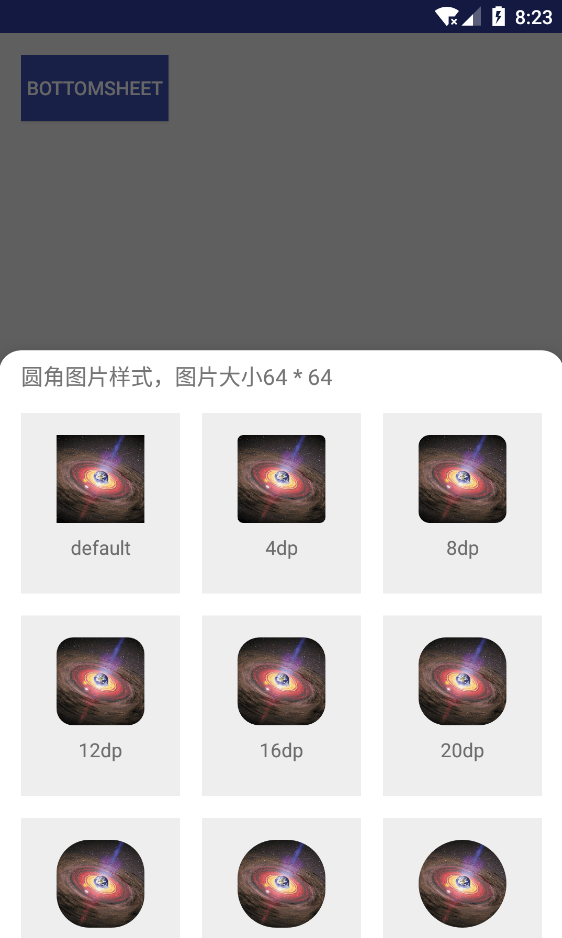关系
BottomSheet不是真正存在的类,而是一种称呼,表示该种控件类型,参照Google翻译,本文以下称之为“底页”,就是从屏幕底部弹出的工具条。与之对应是BottomSheetBehavior的行为类,它需要附属某个控件使用。该行为性质包括:
- 可以从底部弹出
- 可以上下拖拽布局
- 可以单击淡黑色遮罩隐藏/关闭
BottomSheetDialog继承Dialog,是一种对话框,它是拥有BottomSheetBehavior行为的对话框,从而实现从底部弹出和上下拉伸的效果。BottomSheetDialogFragment是包含BottomSheetDialog的片段(Fragment),所以它可以同时利用Fragment的特点和BottomSheet这一交互效果。
BottomSheetBehavior
使用
在xml布局文件中与CoordinatorLayout配合使用。如下设置后,NestedScrollView具有BottomSheetBehavior的性质,且一开始就显示在布局中,初始的显示高度为peekHeight值。背景没有淡黑色遮罩,可以上下拖拽。
1
2
3
4
5
6
7
8
9
10
11
12
13
14
15
16
17
18
19
20
21
| <?xml version="1.0" encoding="utf-8"?>
<android.support.design.widget.CoordinatorLayout
xmlns:android="http://schemas.android.com/apk/res/android"
xmlns:app="http://schemas.android.com/apk/res-auto"
android:layout_width="match_parent"
android:layout_height="match_parent"
android:fitsSystemWindows="true">
<android.support.v4.widget.NestedScrollView
android:id="@+id/bottom_sheet"
android:layout_width="match_parent"
android:layout_height="wrap_content"
app:behavior_hideable="true"
app:behavior_peekHeight="50dp"
app:layout_behavior="@string/bottom_sheet_behavior">
</android.support.v4.widget.NestedScrollView>
</android.support.design.widget.CoordinatorLayout>
|
上述代码中有两个属性值得注意。
app:behavior_hideable:当我们上下拖拽时,布局是否可以全部隐藏。如果设置为真,那么你向下滑完之后,布局会被隐藏起来,然后就滑不出来了。。。(除非你写了按钮之类的逻辑控制它的行为)所以要谨慎。app:behavior_peekHeight:是当底页关闭的时候,底部我们能看到的高度,默认是0不可见。
获取行为
在布局文件中声明之后,就可以在代码中获取行为了。
1
2
3
4
|
View = findViewById(R.id.bottom_sheet);
BottomSheetBehavior behavior = BottomSheetBehavior.from(view);
|
方法
行为的一些常用的方法。
| 方法名 |
用法示例 |
说明 |
setHideable |
setHideable(true) |
对应app:behavior_hideable属性 |
setPeekHeight |
setPeekHeight(500) |
对应app:behavior_peekHeight属性 |
setBottomSheetCallback |
/ |
设置监听回调 |
setState |
setState(BottomSheetBehavior.STATE_EXPANDED) |
设置底页状态 |
BottomSheetCallback
底页的监听回调事件。
1
2
3
4
5
6
7
8
9
10
11
12
| behavior.setBottomSheetCallback(new BottomSheetBehavior.BottomSheetCallback() {
@Override
public void onStateChanged(@NonNull View bottomSheet, int newState)
{
}
@Override
public void onSlide(@NonNull View bottomSheet, float slideOffset)
{
}
});
|
底页行为一共有五种状态。
STATE_HIDDEN: 隐藏状态。默认是false,可通过app:behavior_hideable属性设置。
STATE_COLLAPSED: 折叠关闭状态。可通过app:behavior_peekHeight来设置显示的高度,peekHeight默认是0。
STATE_DRAGGING: 被拖拽状态
STATE_SETTLING: 拖拽松开之后到达终点位置(collapsed or expanded)前的状态。
STATE_EXPANDED: 完全展开的状态。
BottomSheetDialog
这是具有底页行为性质的对话框,不需要与CoordinatorLayout配合使用。弹出时,背景为出现一层淡黑色遮罩。需要相关逻辑控制它的弹出。
使用——布局文件
设计BottomSheetDialog内部的视图。Xml可以不用被CoordinatorLayout包裹,但是还是推荐实用推荐的滑动控件NestedScrollView。
1
2
3
4
5
6
7
8
9
| <?xml version="1.0" encoding="utf-8"?>
<android.support.v4.widget.NestedScrollView
xmlns:android="http://schemas.android.com/apk/res/android"
android:layout_width="match_parent"
android:layout_height="match_parent">
</android.support.v4.widget.NestedScrollView>
|
使用——代码文件
使用上述的布局文件,假设名称为layout_bsd。可以获取行为实现自定义。要注意的是从视图的父视图((View)view.getParent())获取底页行为,否则会报错:
The view is not a child of CoordinatorLayout.
1
2
3
4
5
6
| BottomSheetDialog dialog = new BottomSheetDialog(context);
View view = getLayoutInflater.inflate(R.layout.layout_bsd, null);
dialog.setContentView(view);
BottomSheetBehavior behavior = BottomSheetBehavior.from((View)view.getParent());
dialog.show();
|
BottomSheetDialogFragment
有两种用法。
- 当作中装了一个底页对话框的
Fragment。实际是与底页对话框的作用和使用方法是相同的。
- 具有底页行为的
Fragment。
用法一——披着Fragment外衣的BottomSheetDialog
重写BottomSheetDialogFragment中的onCreateDialog方法。可以看到和上面BottomSheetDialog的代码是相同的。同样可以在中间获取行为用于自定义。要注意是子视图的扩充用到的是View.inflate的静态方法,否则会报错。
1
2
3
4
5
6
7
8
9
| @Override
public Dialog onCreateDialog(Bundle savedInstanceState)
{
BottomSheetDialog dialog = (BottomSheetDialog) super.onCreateDialog(savedInstanceState);
View view = View.inflate(getContext(), R.layout.dialog_bottom_sheet, null);
dialog.setContentView(view);
mBehavior = BottomSheetBehavior.from((View) view.getParent());
return dialog;
}
|
用法二——真正的Fragment
重写BottomSheetDialogFragment中的onCreateView方法。代码与Fragment的常规写法相同。不过不好的一点是不容易获取行为。如果要强行获取行为的话,可以使用以下的代码。
1
2
3
4
5
6
7
8
9
10
11
12
13
14
15
16
17
18
19
| @Override
public void onStart() {
super.onStart();
Dialog dialog = getDialog();
if (dialog != null) {
View bottomSheet = dialog.findViewById(R.id.design_bottom_sheet);
bottomSheet.getLayoutParams().height = ViewGroup.LayoutParams.MATCH_PARENT;
}
View view = getView();
view.post(() -> {
View parent = (View) view.getParent();
CoordinatorLayout.LayoutParams params = (CoordinatorLayout.LayoutParams) (parent).getLayoutParams();
CoordinatorLayout.Behavior behavior = params.getBehavior();
BottomSheetBehavior bottomSheetBehavior = (BottomSheetBehavior) behavior;
bottomSheetBehavior.setPeekHeight(view.getMeasuredHeight());
((View)bottomSheet.getParent()).setBackgroundColor(Color.TRANSPARENT);
});
}
|
但是如果这两个方法都重写了,那么以onCreateView里的视图为准,onCreateDialog会被覆盖。
扩展:通过设置style实现圆角样式
如下设置好之后,在创建BottomSheetDialog时传入样式。
1
| BottomSheetDialog dialog = new BottomSheetDialog(context, R.style.BottomSheetDialog);
|
1
2
3
4
5
6
7
8
9
10
11
12
13
14
15
16
17
18
19
20
21
22
23
24
25
26
27
|
<style name="BottomSheet" parent="Widget.Design.BottomSheet.Modal">
<item name="android:background">@drawable/bg_bottom_sheet</item>
</style>
<style name="BottomSheetDialog" parent="Theme.Design.Light.BottomSheetDialog">
<item name="android:windowIsFloating">false</item>
<item name="bottomSheetStyle">@style/BottomSheet</item>
<item name="android:statusBarColor">@color/transparent</item>
<item name="android:navigationBarColor">@color/white</item>
</style>
<shape xmlns:android="http://schemas.android.com/apk/res/android"
android:shape="rectangle">
<corners
android:topLeftRadius="16dp"
android:topRightRadius="16dp">
</corners>
<solid android:color="@android:color/white"/>
<padding android:top="16dp"
android:left="8dp"
android:right="8dp" />
</shape>
|
效果图

参考

